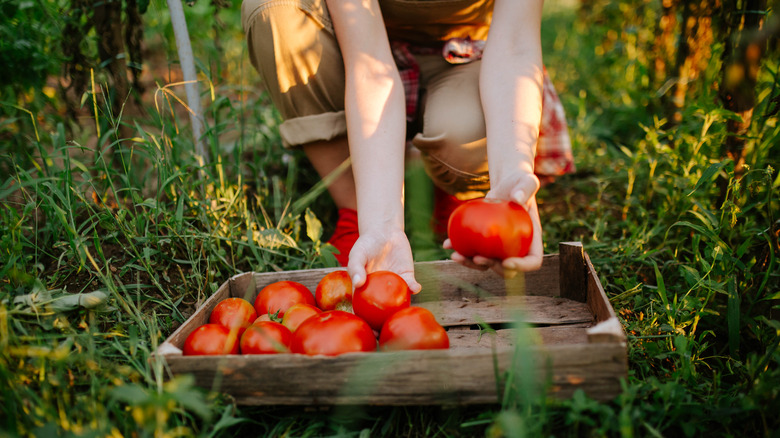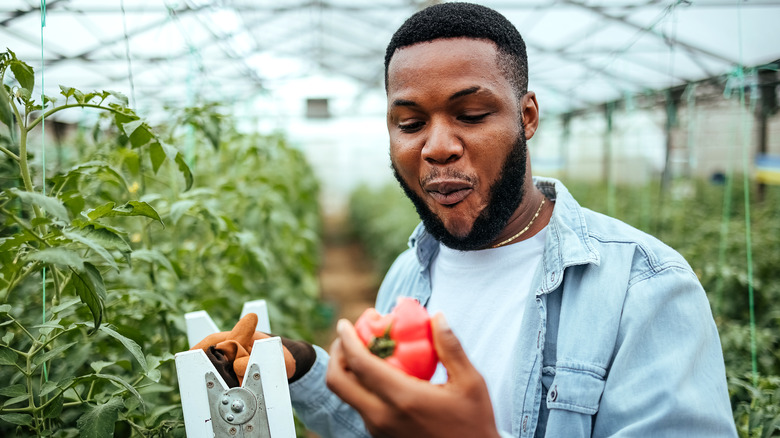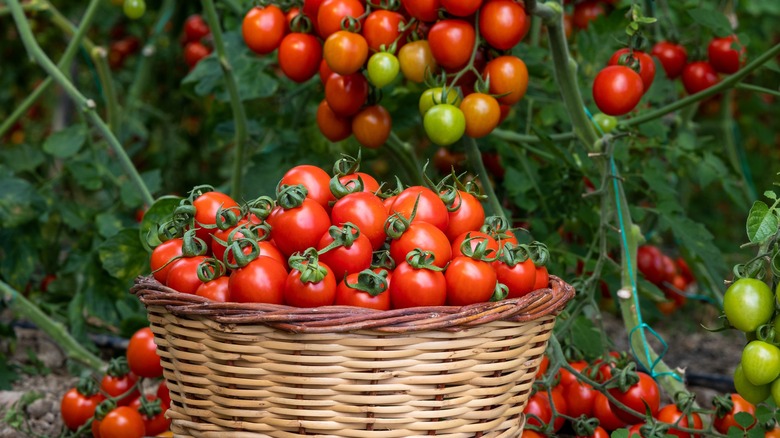Here's Why The Tomatoes You Grew Taste So Bitter
There's a unique sense of fulfillment derived from nurturing a garden. When it comes to growing tomatoes, this satisfaction can be unparalleled. However, when the fruits of your careful nurturing — the tomatoes you've been eagerly awaiting — betray your expectations with a biting bitterness, it can be quite disappointing. Such a scenario could lead you to question your gardening abilities, turning the sweet anticipation of a homegrown tomato harvest into a confusing mystery. It's important to keep in mind that a wide range of factors, far beyond the basic act of planting and caring for the plants, affect the taste of tomatoes.
The tomato variety you choose to grow can significantly impact the flavor, with some types leaning towards the bitter side. Moreover, the delicate balance of watering, the nutrients present in your soil, and the weather conditions in which your tomatoes are growing all have a part to play. Each of these factors can upset the balance of sweetness and acidity in your tomatoes, leading to that disconcerting bitterness.
No doubt, the knowledge that you've nurtured your plants with utmost care only makes the bitter taste in your mouth that much more perplexing. Rest assured that this bitterness is not a reflection of your gardening skills, nor is it an unsolvable mystery. It's more of a puzzle that can be solved by choosing the right variety and providing a consistent water supply, among other things. All this and more will be explained below.
Why your tomatoes taste bitter
The flavor of a tomato is a complex interplay of sweetness and acidity, and when this balance is skewed, it can result in a bitter taste. Several factors can influence this balance, and it's your task as a gardener to uncover and address these potential issues. Firstly, the variety of tomatoes you've chosen plays a crucial role. Different tomatoes possess distinct flavor profiles, some being naturally sweeter or more acidic than others. Certain varieties are genetically predisposed to have a bitter taste. So, if you're consistently harvesting bitter tomatoes, consider growing a different type next time. Secondly, the time of the year you grow tomatoes can significantly influence the taste. Extreme weather can stress the plant, leading to the production of bitter fruits. Consistently high temperatures or too cold conditions can have the same bitter effect.
Thirdly, watering practices also contribute to the flavor of your tomatoes. A balance is necessary to maintain the optimal moisture level for flavor development. Fourthly, the nutritional balance of your soil also matters. Tomatoes require specific amounts of various nutrients to produce sweet, juicy fruits. An imbalance or deficiency in these nutrients can lead to a bitter taste. Lastly, green tomatoes can taste bitter, primarily because they are unripe. As they mature, tomatoes undergo a process where sugars accumulate, and acidic contents decrease, leading to their characteristic sweet taste. However, when you bite into a green, unripe tomato, the lack of sugars and high acidity contribute to a bitter flavor.
Improving your tomato flavor: turning bitterness into sweetness
Having identified the possible reasons for the bitterness of your tomatoes, you can now take informed actions to enhance their flavor. Choosing the right tomato variety for your climate and taste preferences can make a significant difference. Your watering practices also warrant attention. By ensuring a consistent and adequate water supply, you help your tomatoes achieve a good balance of sweetness and acidity. Similarly, your soil health is critical. The availability of essential nutrients in your soil directly impacts the flavor of your tomatoes. Assessing your soil's current state and incorporating necessary amendments, such as compost or fertilizers, can boost its nutritional profile and, in turn, improve your tomatoes' taste.
Protection against extreme weather conditions is another critical aspect. Your tomatoes may need shields like protective covers or shade cloths if they're exposed to harsh weather. Extreme temperatures can stress your plants, leading to the production of bitter fruits. While the experience of tasting bitter tomatoes from your garden can be disappointing, viewing this as a learning opportunity is important. With the insights gained, adjust your practices, and anticipate a harvest of sweet, flavorful tomatoes in the future.


